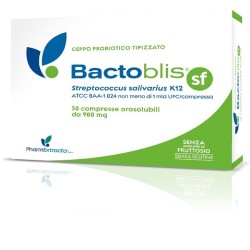Pharmextracta Bactoblis Sf 30 Compresse Orosolubili
€ 25,95
calendar_month 06/08/2024 - di Boscia Club

Bad breath originating from the stomach, often referred to as halitosis, can be quite unpleasant. While it can be caused by various factors, including poor oral hygiene, certain foods, and medical conditions, it can also stem from digestive issues.
Here are some natural remedies to help combat bad breath from the stomach:
Probiotics help restore the balance of beneficial bacteria in your gut. This can indirectly improve oral health by reducing the production of gases associated with bad breath. This associated to fiber can improve gut health
While these remedies can help manage bad breath, it's essential to identify the root cause of the problem. If you have persistent bad breath, consult a healthcare professional for proper diagnosis and treatment.
Digestive enzymes can be a great ally in the fight against bad breath, but it's important to understand how and why they work.
Bad breath often starts with digestive issues. When food isn't fully digested, it ferments in the intestines, producing gas and smelly compounds that are then expelled through the breath.
This is where digestive enzymes come in:
The most commonly used digestive enzymes to combat bad breath are:
Nutriva zymofrut promotes physiological digestive functions and is useful in cases of bad breath.
Longlife Vegzyme is a food supplement based on digestive enzymes, useful for promoting the digestion of carbohydrates, fats and proteins.
Categorie del blog





check_circle
check_circle
check_circle
check_circle



